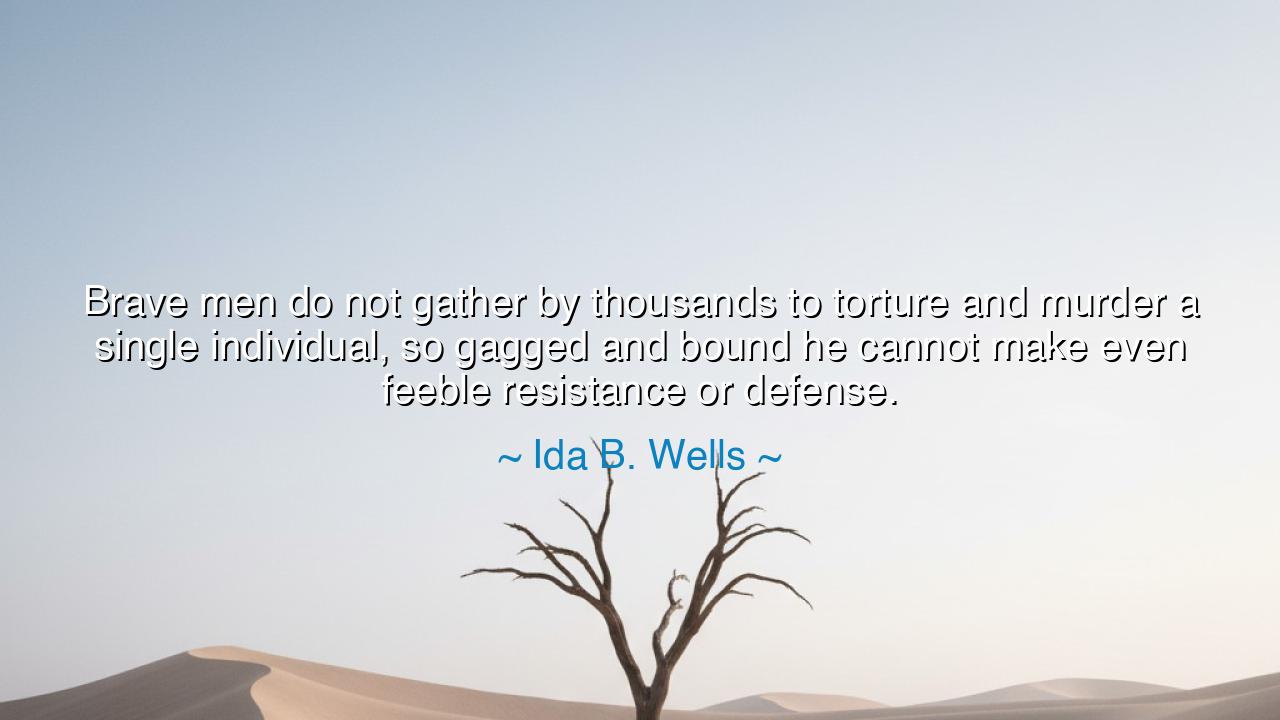
Brave men do not gather by thousands to torture and murder a
Brave men do not gather by thousands to torture and murder a single individual, so gagged and bound he cannot make even feeble resistance or defense.






O children of wisdom, hear the words of Ida B. Wells, a woman whose courage in the face of injustice stands as a beacon for future generations. She said, "Brave men do not gather by thousands to torture and murder a single individual, so gagged and bound he cannot make even feeble resistance or defense." These words are not only a condemnation of violence but a call to recognize the deep dishonor that lies in the exploitation and oppression of the powerless. Wells, whose voice rang out against the horrific practice of lynching in the United States, challenges us to see the deep contrast between true bravery and the cowardice hidden behind acts of cruelty.
In the ancient world, the concept of bravery was often bound up with honor and righteousness. Homer, in his great epics, depicted the warrior as one who faced the enemy in open combat, with courage and valor on the battlefield, often risking his own life for the greater good. The Greek hero fought for honor, for justice, not to assert dominance over the weak, but to protect the vulnerable. Bravery in ancient times was defined by the courage to face one’s adversaries directly, in open conflict, with honor guiding the hand. The true warrior did not thrive on the suffering of the defenseless, but rather sought a cause that was worthy of battle.
Wells, however, calls us to witness a different kind of violence, one that is far removed from the heroic clashes of the battlefield. She speaks of men who gather not to engage in an honorable fight, but to torture and murder those who have no power, no ability to resist. Lynching in the American South during her time was not a battle of equals, but a cowardly act perpetrated by mobs upon individuals who were tied, gagged, and powerless. Wells recognized that true bravery cannot be found in the actions of those who attack the defenseless, but in the ability to stand up for justice and confront injustice, no matter how powerful the forces of oppression.
Consider, O children, the story of Socrates, the great philosopher of Athens, who faced a trial and eventual execution not because he sought power or dominance, but because he stood against the injustice of his time. Socrates could have easily complied with the demands of his accusers, lived a life of comfort, and avoided the painful death that awaited him. Yet, he chose to confront corruption and injustice, to stand for truth even in the face of overwhelming odds. Socrates did not wield a sword against his enemies; instead, he wielded the power of reason and courage to challenge the injustices of his society. In contrast, those who sought to punish him with the death penalty did so not with the bravery of honorable men, but with the cowardice of those who fear the truth and seek to silence it through force.
In modern times, we see the same cowardice reflected in the actions of those who abuse their power, whether through political oppression, economic exploitation, or social injustice. Wells's condemnation of the lynch mobs is not only a criticism of a specific moment in history, but a broader warning to all who would seek to dominate or oppress the vulnerable. Brave men, she reminds us, do not find glory in oppressing those who cannot fight back, but in standing for what is just, for defending the defenseless, and for confronting cruelty wherever it exists.
The lesson from Wells’ words is profound: true bravery is not found in the exercise of power over the weak, but in the courage to defend the powerless, to stand against the forces of injustice, and to live with honor. The true measure of a man’s strength is not in his ability to oppress or harm, but in his ability to protect and uplift those who are vulnerable. To be truly brave is to fight for justice, to stand for what is right, and to speak out against the violence and cruelty that seeks to dominate those who have no means of resistance.
So, O children, let this wisdom guide you: do not seek strength in dominance, but in compassion and justice. The true warrior is the one who faces not the defenseless with force, but the injustice of the world with courage. Stand with those who are vulnerable, and be a voice for those who cannot speak. True bravery does not lie in harming those who cannot defend themselves, but in defending those who are oppressed, in fighting for what is right, and in standing firm against violence and tyranny. Just as Ida B. Wells stood against the lynch mobs of her time, so too must we stand against all forms of oppression, armed not with violence, but with the strength of truth and justice.






AAdministratorAdministrator
Welcome, honored guests. Please leave a comment, we will respond soon